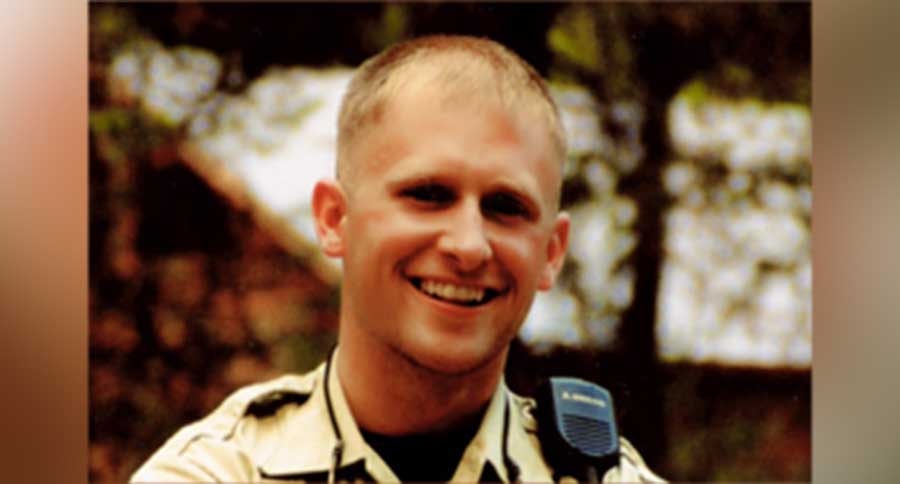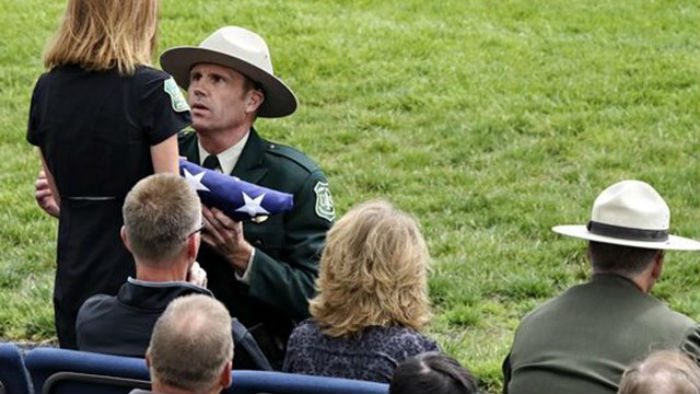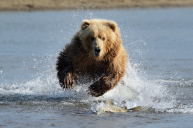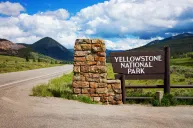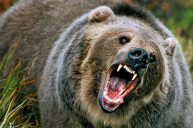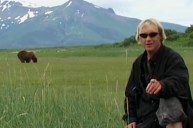The fatal encounter that a forest ranger had with a grizzly occurred because the ranger collided with the bear while mountain biking.
The investigation into the fatal mauling of a forest ranger by a large grizzly has concluded that the incident occurred as a result of the ranger inadvertently colliding with the bruin while mountain biking.
Last June, we reported the incident which occurred just outside of Montana's Glacier National Park. An interagency Board of Review has done an investigation into the unfortunate encounter and has concluded that Forest Service law enforcement officer Brad Treat, 38, had surprised and collided with the bear while mountain biking, which sparked the attack.
The board consisted of state and federal wildlife officials, and was chaired by retired U.S. Fish and Wildlife Service grizzly bear biologist Chris Servheen. Servheen relayed that the evidence indicated the attack was not predatory, but rather was a surprise encounter.
Treat was biking with a friend on the Outer Trail of the Green Gate Trails in the Flathead National Forest, just outside of Glacier National Park, when the encounter occurred. Treat rounded a blind curve on the trail sometime between 1:30-2:00pm and struck the grizzly bear at a rate of 20-25 mph.
The impact hurled Treat over the bike's handlebars and caused him to fracture both of his wrists and left scapula as he tried to break his fall. "The lack of evasive steering and lack of skidding are further evidence of the surprise and high speed of the collision," the Board of Review report stated.
Forensic samples taken from the victim and his bicycle helmet, which had been bitten to pieces by the bear, indicated that the grizzly was an 18-20-year old male with no history of human-bear conflict. The bear had been previously captured back in 2006 as part of a research project, and at that time the bear was estimated to weigh 370 pounds.
Treat's riding companion was approximately 20-25 yards behind him and out of visual contact when the accident occurred. However, the companion stated that he heard the crash as well as the bear make a noise "like it was hurt."
Upon rounding the curve the companion saw the bear standing over Treat in the trail about 37 feet away.
For around 30 seconds Treat's riding partner tried to figure out what to do. Unsure if he should try to "push" the bear off of Treat, and not being equipped with bear spray, a firearm or any other deterrent, the man decided to head back up the trail to seek help.
The companion heard vehicles on Highway 2, about a mile from the trail, so he began running through the forest toward the road, carrying his bike. He flagged down a vehicle and was driven to a phone to call for help.
When responders arrived at the scene Treat was already dead and the bear was nowhere in the vicinity. Additionally, no part of Treat's body had been consumed by the bear nor did the bear try to cache the victim's body.
While the initial June account of the incident indicated that officials had searched for the bear, it could not be found.
The Board of Review report indicated that, "Bears involved in such surprise encounters are not captured or removed in most cases, even when the result of the encounter is serious injury or death to a human."
Treat's funeral was attended by more than 2,500 people. Robert Field, a patrol captain with the U.S. Forest Service and former partner of Treat's, said at the service, "He leaves behind an incredible legacy that will impact this community for years to come. He touched the lives of so many people through his work."
Treat's wife of 16 years, Somer Treat, hopes that people will remember the way that her husband's giving and selfless spirit, and the way that he served his community and those he came in contact with, rather than the gruesome way he died.
"He'd do anything, and nothing was beneath him," she said. "He was rappelling out of a helicopter to pick someone off a cliff, and then he was cleaning up a campfire."
Neither would she reveal Treat's riding companion's name, stating that the incident has been traumatizing for the man.
The Flathead Beacon also reported that,
Following the investigation, the Board of Review members also released a set of recommendations related to mountain biker safety in bear country.
The recommendations include suggestions to stay vigilant, slow down, carry bear spray, make noise, don't ride alone, never ride at dusk, dawn or night, don't think "it won't happen to me" and remember bears live there and you are just a visitor.
Like what you see here? You can read more great articles by David Smith at his facebook page, Stumpjack Outdoors.
NEXT: Bear Spray Misconceptions: Better Safe Than Sorry
